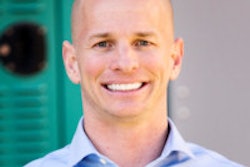
A dog needs training. Those dogs that sit, come, and play dead on command have hours of training behind them. For a dog to perform its tasks, it needs consistent, continuous effort on the trainer's part.
 Curtis Marshall is the vice president of marketing at Dental Intel.
Curtis Marshall is the vice president of marketing at Dental Intel.I am the Naked Dentist. With a powerful analytic tool, I strip a dental office of all its clothes, makeup, and accessories to reveal the true problem areas. Once the problem areas are identified, we tone or occasionally perform surgery to achieve lifestyle and financial success that the doctor wants. This week, we will discover that training a dog is similar to running a practice.
Recently, my family got a puppy. We researched for months trying to figure out what was the best fit for our family. We finally found a Labradoodle breeder that we liked and went to pick up our puppy. Kona is a small, black fluffy ball of fur, and we instantly fell in love with him.
Cesar Millan
Before we got home, I started to research training this new dog. I quickly found some articles from the leading dog trainer in the world, Cesar Millan. If you have a dog, you have heard of Millan and seen his hit TV series. Millan is famous for "rehabilitating" dogs that seem to be untrainable.
Here is what Millan says, in his own words, is the secret to dog training: "I learned by being reminded again and again of the importance of follow-through. It isn't enough for me to show someone how to give a correction or explain how to establish boundaries for their dog. They have to learn what I'm explaining, and then apply it after I'm gone -- continuously and consistently."
So how does that relate to dentists?
Many practices attend seminars and they learn some amazing information. The whole team gets excited to update, change, or add new systems to the office. Yet time and time again, within a week or two, the dental teams go back to the same systems they were using before they attended seminar. We see this same thing happen at the new year with new habits and goals we want to achieve either personally or in business.
Dr. Utah
What does Cesar's way of training a dog and a successful dental practice have in common? Continuousness and consistency. Let's look at an example.
In my hometown, there is a dental office that I stripped down and discovered some life-changing numbers. When we fixed a couple of things in the office, the doctor could finally buy the Tesla car that he had always wanted.
First, I synced all his data and discovered the top two numbers that needed to be improved. Next, I provided him with dental intel that allowed him to the see daily the progress of those two numbers. Within two and half weeks, Dr. Utah had exceeded the goal that we had set for these two numbers. Dr. Utah was like a kid on Christmas morning, he was thrilled and he could taste that Tesla car in his driveway!
Turn for the worse
“It was sad to see, because an office that was energetic and prosperous changed into an office with frustration and contention.”
By simply monitoring those two numbers, Dr Utah and his team were able to obtain a goal with a bit of extra effort. But as soon as they obtained the goal, they stopped monitoring. The expectation was that "this is the new the norm, so we don't need to monitor anymore."
Just like when we leave a dog without continuous training, this Utah office went right back to the numbers that were in place before I stepped in. It was sad to see, because an office that was energetic and prosperous changed into an office with frustration and contention. They had reached the goal, they knew they could do it again, but what changed?! It all boiled down to consistency. Dr. Utah could feel his new Tesla driving away from him.
Culture
In regard to my dog, the whole family is set and understands that it is important to continuously and consistently train him. So when my daughter is tired and doesn't want to walk the dog or when I do not reward him for completing a task that I commanded, another family member reminds us that we all promised to train this dog and that we must do what is required. It happens to all of us -- we want to do what is comfortable. Without a culture or without support, change is doomed to fail.
Dr. Utah knew what to monitor. He knew how to use his dashboard, and he knew the action items necessary to hit his goals. What Dr. Utah failed to do was share this information with his staff. Instead of creating a culture of support, he gave his staff a "to do" list that they were to blindly follow, not knowing the "what, why, or how" of the system.
Dr. Utah left the office for a fishing trip and kept the office open. When he returned, he realized that nothing had been tracked, nothing had been monitored, and his goal slipped away that month.
Create a culture of support by involving the staff in what they are monitoring, why they are monitoring, and how it should be done.
To undress your practice and train your team, remember to make continuousness and consistency apart of your team's culture.
Let's get naked together!
Curtis Marshall serves as the vice president of marketing at Dental Intel. If you would like your practice to be in the next Naked Dentist column and have your practice undressed, contact him at [email protected] or 801-380-7070.
The comments and observations expressed herein do not necessarily reflect the opinions of DrBicuspid.com, nor should they be construed as an endorsement or admonishment of any particular idea, vendor, or organization.

















